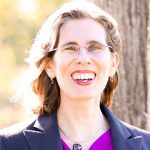 Dear WUU Community,
Dear WUU Community,
My parents had a mixed marriage—Democrat and Republican, that is. My mom, the more politically active of the two, used to do volunteer canvassing for local Democratic candidates in our neighborhood, while Dad read his Wall Street Journal editorials and grumped about the liberal policies he believed were bankrupting the country. For me, that was normal. My parents loved each other, and they disagreed on politics—a lot. And it was OK. They regularly joked about cancelling out each other’s vote. And it was OK.
As we enter into our month of Beloved Community, I’m struck by how quaint my parents’ handling of their political differences sounds today. Nearly three decades of increasing polarization has taken its toll. Today, ordinary people rip each other to virtual shreds on social media without a second thought. Many politically mixed couples, even those in decades-long committed relationships, have found it harder and harder to talk about their differences. What used to be fodder for jokes and the occasional eye-roll now feels dangerous. Too intense. Too volatile.
In some ways the polarization has been clarifying. Many of us are far more willing than we used to be to speak out for what we believe to be right and true, and that is something to celebrate. Our clarity moves us toward the justice we seek.
But still, many of us are longing for a different national culture—a style of relating to one another that prizes love and respect over vitriol and contempt. In this month of Beloved Community, I encourage you to model a spirit of clarity and love in every meeting, every Facebook post, every interaction with another human being. And if that feels hard, I hope you will draw courage and inspiration from these words of Dr. King, who more than anyone else showed us how to live the beloved community:
Our ultimate end must be reconciliation; the end must be redemption; the end must be the creation of the beloved community. We have before us the glorious opportunity to inject a new dimension of love into the veins of our civilization. The type of love that I stress here is not eros, a sort of esthetic or romantic love; not philia, a sort of reciprocal love between personal friends; but it is agape which is understanding goodwill for all men. It is an overflowing love which seeks nothing in return. It does not begin by discriminating between worthy and unworthy people…It begins by loving others for their sakes and makes no distinction between a friend and enemy; it is directed toward both. It is this type of spirit and this type of love that can transform opposers into friends. It is love seeking to preserve and create community. It is the love of God working in the lives of men. This is the love that may well be the salvation of our civilization.
—Martin Luther King, Jr., from “The Role of the Church in Facing the Nation’s Chief Moral Dilemma,” 1957
Yours in love and faith,
Rev. Laura
